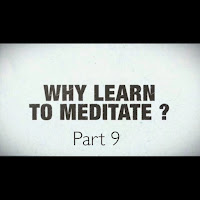Over the past several weeks I’ve been working with students in a 200-hour Yoga Teacher Training and helping them develop a daily meditation practice. I asked each student to explain, in their own words, their personal motivation for meditating. I’m sharing one student’s response per day. To read the introduction to this series,
click here.
STUDENT 9: “ I never thought meditation could be so powerful...”
STUDENT 9 took an interesting approach by journaling her experience after meditation on three separate occasions. In the process, not only did she gain insights into herself and her past, but she recorded how her own views of meditation and experiences with it radically shifted over the course of a few weeks.
March 18, 2015
Honestly, I do not meditate in the traditional sense. I sometimes feel I am meditating while I am baking but clearly I am not still nor is my mind clear because I know I have to take the cookies out of the oven in ten minutes so I’ll wash the dishes in the meantime. However, baking comes easily to me and is practically a routine, I am quite relaxed even though I am very conscious of time.
My very first experience meditating was at the age of 8 when my parents dropped me off at our Buddhist Taoist temple after school to keep the elder company. Pastor Chiang had a practice of meditating daily. The only guidance she gave was to sit on this chair with my hands on my knees, eyes closed and to be quiet. I think we sat for an hour. Of course, I opened my eyes from time to time to look at her to see if she had her eyes closed, but also to look around the room. I remember waiting to see what would happen – maybe the room would change, maybe she would change – I was not scared, just curious. I cannot remember much more from that experience, however, whenever I think of meditation, I cannot help but to relate this to Pastor Chiang.
Unfortunately, when Pastor Chiang comes to my mind, I can’t help but also think of all the pain she caused my family. But I have grown and do not associate meditation and Pastor Chiang together. However, I have kept my distance from stepping foot into any temple and meditating since my father passed. My father devoted his life to that temple and helping Pastor Chiang but all she did was cause us tremendous pain, especially to my mother.
I am a busy body and feel like I have to make use of all 24 hours in a day so I spend every minute accomplishing something. While I have not practiced meditation because I have not looked at it as an act of accomplishment, I am willing to do my homework and try to meditate daily for 10 minutes and see where it takes me.
March 19, 2015
Wow. I did my first 10 minute meditation last night. I realized that I had associated meditating to not just Mrs. Chiang but more so to all the hurt she caused my family and that I don’t think I have forgiven her for this. Taking the time to clear my mind allowed me to think more clearly afterwards. I realized I had suppressed these feelings of anger.
April 8, 2015
I can finally say I have meditated for 4 days in a row now – my longest stretch since Yoga Teacher Training started. And I find 10 minutes is not long enough. Usually, the monkey mind is still wild the first 5 minutes or I am still getting myself into a comfortable seated position. So out of the 10 minutes, I’ve only had 5 minutes of quality meditation. So last night, I upped it to 15 minutes.
“Alert! Alert! Yet, relax! Relax!” This is so on-point as to how I feel after I have meditated. Four weeks ago, my attitude was I’m so tired at the end of the day, I don’t have time to meditate. I have so much to do and I need to get some sleep - I don’t want to spend 10 minutes of time not being productive. What I have come to realize is that because not only is my mind so active with planning and reminding myself of all the tasks I need to do each day and actually doing all that I do each day, it actually is very productive to force my body and mind to stop and rest. Even more surprising is how relaxed and energetic I feel after I meditate. It’s like we all need a break from training. When training for a marathon, you need to build up the miles gradually, incorporate speed work but also take rest days and let the body and muscles recuperate. My mind is working every waking moment that it also needs to take a rest break. Before meditating, sometimes I have to reread the same paragraph two or three times to really grasp the meaning of the words. I think this is because my mind is so tired or cluttered with so many thoughts it cannot concentrate as well. But after meditating, my mind is clearer and more focused - I understand it the first time around. I have always believed in quality versus quantity but never thought this applied to my mind as well. After meditating, I benefitted from both quantity and quality with my reading.
I have also found myself to be a calmer person after meditating. The past three weeks have been quite challenging with issues I’ve encountered at work. I find myself quite angry in my work environment and have decided I need to leave this environment. I will never be happy here and should not subject myself to this harmful environment but am better able to deal with the situation until it changes. Meditation has helped me see that my personality just will not jive with my coworkers. And my supportive husband has helped me to meditate each day because he feels he needs to get back at me for always nagging him. After I tell him about yet another bad day at work, he immediately tells me to meditate.
Wow, I never thought meditation could be so powerful.
_________________________________
Dennis Hunter is a writer, yogi and meditation teacher living in New York City. He is the author of You Are Buddha: A Guide to Becoming What You Are. He is a co-founder of Warrior Flow™ with his husband Adrian Molina.


















